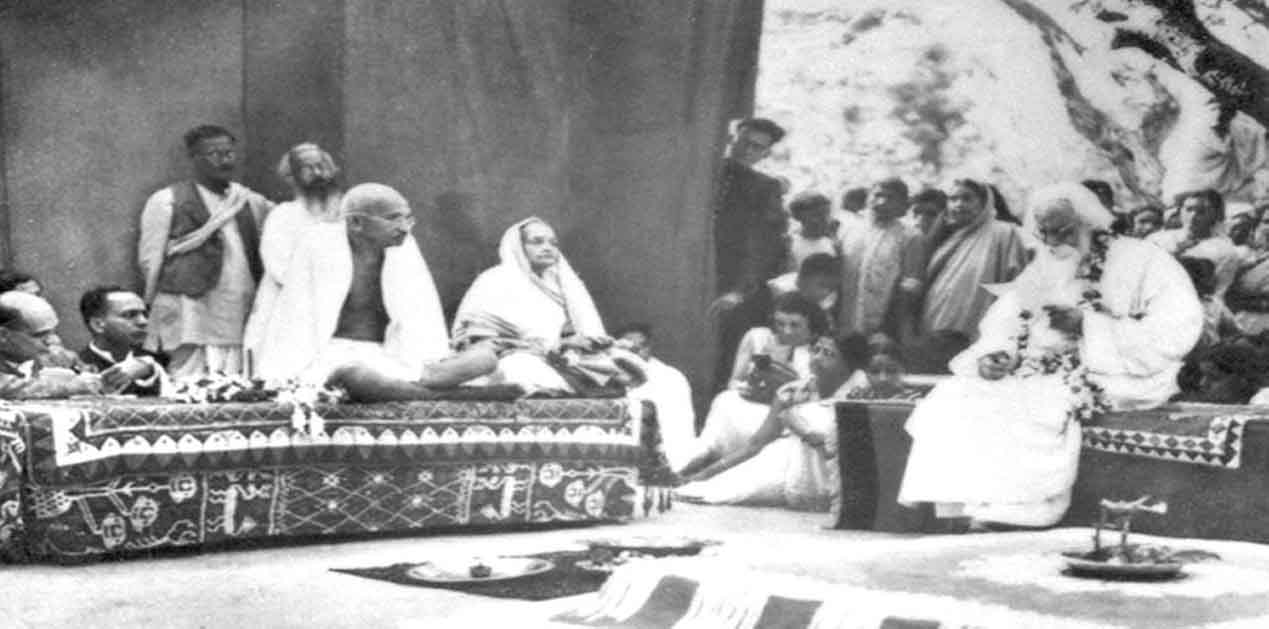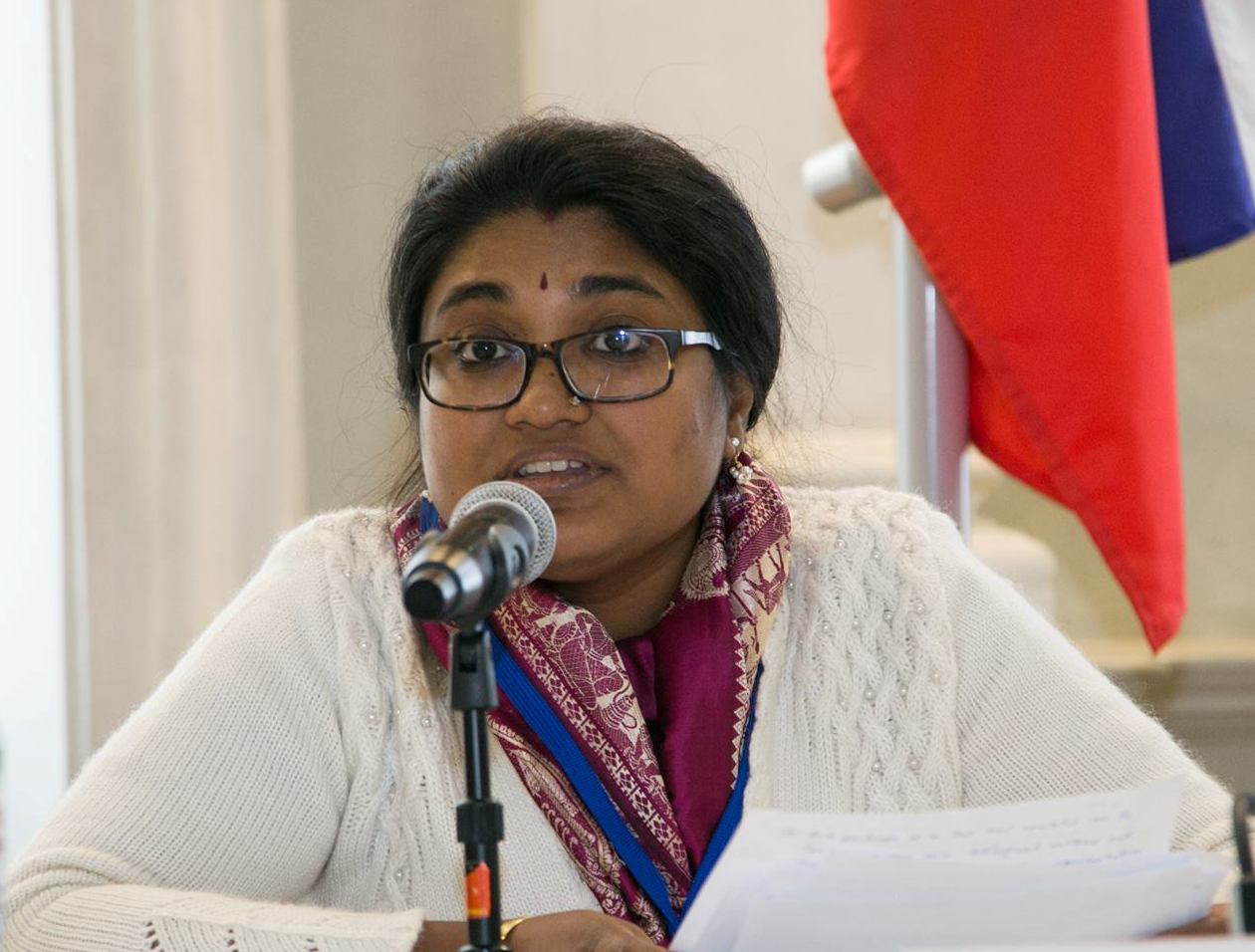In 1917, Rabindranath Tagore came out with a booklet on nationalism. It was a collection of three articles and a poem. Two of these, ‘Nationalism in the West’ and ‘Nationalism in Japan’, were lectures delivered in the USA in 1916-17 and in Japan in 1916 respectively. The third piece, ‘Nationalism in India’, was written in late 1916. Of course, Tagore’s position vis-à-vis nationalism goes far beyond the scope of these three essays and permeates almost the entire corpus of his significant writings—starting from his novels to his debate with Gandhi on nationalism.
The reason why we need to re-visit Tagore in the context of Indian nationalism is that he is the only stalwart from colonial India, who is cited by contemporary critics of nationalism in support of their line of argument. His critique has often been overplayed without being placed in its proper context. Some of Tagore’s views are valid in certain contexts. However, there is another side to the story. This short piece is an attempt at providing a complementary perspective to Tagore’s views on nationalism. It argues that nationalism is not only defensible, but all the more required in India today, but one has only to understand what kind of nationalism. Tagore’s critique was true in its spirit, but it mistook the proper place of nationalism.
Tagore was a complex thinker, whose thought on ‘nationalism’ evolved over years in response to changing situations. He was witness to the long and chequered journey of nationalism in India, other parts of Asia, and the West. His sensitive mind responded with great alertness to this most dominant theme of his times—nationalism—times, that saw the birth of nations and the destruction of nations—both in the name of nationalism. His disenchantment with the Swadeshi movement in India, and finally the World War I—all contributed to his critique of nationalism.
It may not be off the mark to say that Tagore critiqued a particular version of nationalism—a typical embodiment of which was British imperialism. His whole idea was that a particular worldview, different from that in the West, existed in India and that she should not slip into the Western mode of thought which is oppressive and exploitative of others. Nobody can really have a disagreement with this. He wrote, “Politics in the West have dominated Western ideals, and we in India are trying to imitate you. We have to remember that in Europe, where peoples had their racial unity from the beginning, and where natural resources were insufficient for the inhabitants, the civilisation has naturally taken the character of political and commercial aggressiveness. For, on the one hand, they had no internal complications, and on the other, they had to deal with neighbours who were strong and rapacious. To have perfect combination among themselves and a watchful attitude of animosity against others was taken as the solution of their problems,"1 and that “Each nation must be conscious of its mission and we, in India, must realise that we cut a poor figure when we are trying to be political, simply because we have not yet been finally able to accomplish what was set before us by our providence.”2
Secondly, for Tagore, nationalism was too narrow an ideal that weaned one away from the greater ideal of universal humanity. Of course, universal humanism is a great ideal, but at the same time, every ideal has a proper place and function in human life and society. Nationalism also has its importance as an ideal. If one thinks in terms of graded progress from one ideal to another, then Sister Nivedita’s views in this regard shed light on an important facet. She wrote, “Only by the love of our own people can we learn the love of humanity”, and that one “cannot be a cosmopolitan unless one be a nationalist. And to become a nationalist, we must extend our narrow self.”3 The function of nationalism as an ideal is that it teaches one to expand the scope of love, to go beyond oneself and one’s kin to embrace the whole nation as one’s own. Nationalism is certainly not the end of the journey. But for one who would love the whole of humanity, nationalism can be a necessary step. Beyond functionality, nationalism is also about gratitude and love for love’s sake.
Tagore saw the ravages that nationalism could cause, for instance, World War I. Vivekananda could see that the root cause of war was materialism that also informed the Western brand of nationalism. In his critique of a Western-style nationalism, Tagore was, in fact, saying the same thing in a different language. He was wary of nationalism because of the aggressive tendencies within it. Vivekananda would, on the contrary, highlight the spirit of self-sacrifice embedded within nationalism. It matters which element we choose to focus on. For example, having visited Japan, Vivekananda was quite aware of the Japanese efforts at expanding the army and the navy. But he never failed to appreciate the Japanese spirit of patriotism and extreme self-sacrifice for the nation—which is not the same thing as supporting the idea of war.
In fact, a nationalism that turned a blind eye to the ills committed by itself was not acceptable to Vivekananda. It might be worthwhile to reproduce here a very significant episode from Sister Nivedita’s early days in India:
“Into these morning talks at Almora, a strange new element, painful but salutary to remember, had crept…The youngest of the Swami’s disciples at this time, it must be remembered, was an English woman [Sister Nivedita], and of how much this fact meant intellectually—what a strong bias it implied, and always does imply in the reading of India, what an idealism of the English race and all their deeds and history—the Swami himself had had no conception till the day after her initiation at the monastery. Then he had asked her some exultant question, as to which nation she now belonged to, and had been startled to find with what a passion of loyalty and worship she regarded the English flag…His surprise and disappointment at the moment were scarcely perceptible. A startled look, no more. Nor did his discovery of the superficial way in which this disciple had joined herself with his people in any degree affect his confidence and courtesy…But with Almora, it seemed as if a going-to-school had commenced, and just as schooling is often disagreeable to the taught, so here, though it cost infinite pain, the blindness of a half-view must be done away. A mind must be brought to change its centre of gravity…the Swami did not call for any confession of faith, any declaration of new opinion. He dropped the whole question. His listener went free…“Really, patriotism like yours is sin!” He exclaimed once, many weeks later…“All that I want you to see is that most people’s actions are the expression of self-interest, and you constantly oppose to this the idea that a certain race are all angels. Ignorance so determined is wickedness!”4
It is a purblind devotion to one’s own country, rendering one unable to judge impartially from the point of view of justice, is what Swamiji objected to. His expectation from Nivedita to transcend that narrow point of view, in fact, set her free. She transformed greatly over the years. As she evolved spiritually and was at the same time, able to truly assimilate Indian culture, the same Nivedita emerged as one of the greatest champions of Indian nationalism. Further, having become a true nationalist, she also became a true cosmopolitan.
Vivekananda’s own patriotism was never narrow. He was at once one of the greatest critics of the ills of Indian society and one of the greatest lovers of India. But, what Tagore had said of Nivedita, was equally true of her Master - all that was missing and inadequate in India simply aroused his love, not his censure. He loved India, warts and all. And just as a mother’s eye is always vigilant lest her child goes astray, so was his attitude towards his own people, whom he loved immensely. But what kind of love was his? One of his brother disciples, Swami Akhandananda, had remarked that Swamiji’s deshprem was not an easy stuff—it was not patriotism, it was deshatmabodh.5 He had become one with India. In patriotism, the patriot and the Patrie remain separate, and there is always the scope for jingoism. In oneness, there is no other. Till the day we achieve this kind of self-effacing love for India, nationalism would always remain the need of the hour in this country.
End Notes:
- Rabindranath Tagore, Nationalism, The Book Club of California, San Francisco, 1917, p. 117.
- Ibid., p. 118.
- The Complete Works of Sister Nivedita, vol. 5, Advaita Ashrama, Calcutta, 1999, p. 244.
- Sister Nivedita, Notes of some wanderings with the Swami Vivekananda, Udbodhan, Kolkata, 1966, pp. 15-17.
- Swami Purnatmananda, ed., Smritir Aloy Swamiji [in Bengali], Udbodhan, Kolkata, 1989, p. 18.
(The paper is the author’s individual scholastic articulation. The author certifies that the article/paper is original in content, unpublished and it has not been submitted for publication/web upload elsewhere, and that the facts and figures quoted are duly referenced, as needed, and are believed to be correct). (The paper does not necessarily represent the organisational stance... More >>
Image Source: http://3.bp.blogspot.com/_pCG_c3Rq788/SUyPbBrY5UI/AAAAAAAAEQU/BOuvpAvQacA/s0/Gandhi_with_Tagore_Shantiniketan_1940.jpg











Post new comment